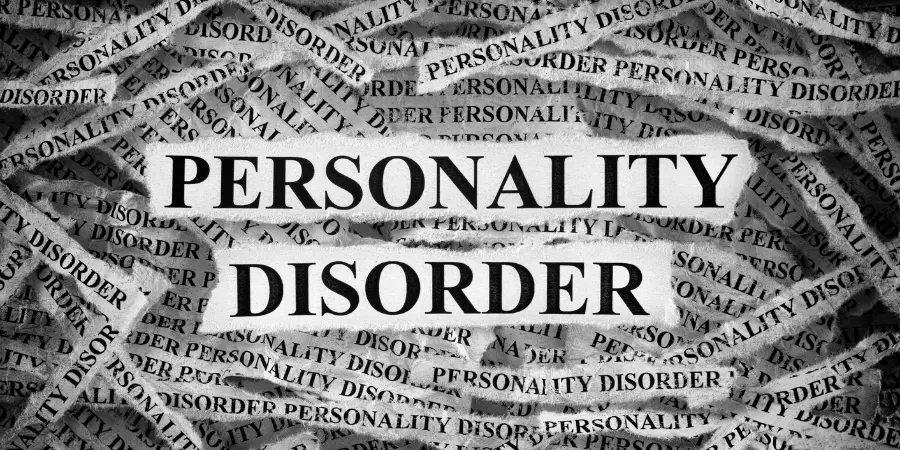Last Updated:
August 7th, 2025
Personality Disorder and Addiction | Symptoms and Treatment
A personality disorder is a condition which affects the way that individuals behave, interact, and perceive the world around them. Some of the emotions faced by those with personality disorders can cause problems to their mental health and wellbeing. Findings show that around one in twenty people in the UK has a personality disorder. Unfortunately, however, as this condition is often difficult to recognise, many individuals go undiagnosed for a long time.
If someone with a personality disorder also suffers from addiction, this is referred to as a co-occurring disorder. For more information about personality disorders and addiction, how they relate to one another and what to do if you or a loved one require support, read on for more information.

What is a personality disorder?
There are several different branches of personality disorder. But from a more general perspective, those diagnosed with the condition will think, feel, and behave in a way that is different from those without the disorder. For example, where some people can manage and regulate their emotions with ease, those with certain personality disorders may have a tough time controlling their feelings and respond with outbursts or mood swings. This can pose considerable difficulties, and the individual may turn to certain behaviours as a method to cope, like drinking more often to calm their nerves. However, if these behaviours are not properly managed, this can result in an addiction.
Why do those with personality disorders develop an addiction?
Addiction is a condition characterised by a compulsive need for a habit-forming substance or behaviour, relying on it excessively despite the negative consequences. Fortunately, addiction is a highly treatable condition and those who are struggling benefit from regular treatment and care, designed to help them overcome their illness in a safe, nurturing space.
There are a number of different personality disorders, and the reasons for an addiction developing will be unique vary from person to person. However, some of the characteristics displayed in those with personality disorders could highlight why they may turn to addictive behaviours. Some of these traits include:
- Impulsivity
- Anxiety
- Low tolerance for stress
- Feelings of emptiness and despair
- Seeing the world in extremes (i.e., black and white, no ‘grey area’)
- Reckless behaviours

For example, an individual with paranoid personality disorder could rely on habit-forming substances to escape particularly distressing emotions. On the other hand, someone who suffers from borderline personality disorder might use substances to cope with low self-esteem, or combat feelings of depression. Turning to substances as a method of self-medication is quite prevalent in those with personality disorders and, at the time, can even seem like a cure for uncomfortable or distressing feelings. However, more often than not, these substances are just a temporary measure and will only exacerbate pre-existing mental health conditions as a result.
Is it common for those with personality disorders to suffer from addiction?
Anyone has the potential to develop an addiction, and it is important to be aware that this illness can impact any of us at any time. However, in those with a personality disorder, it has been found that around 22% of people with the condition have encountered issues with addiction.
Borderline personality disorder (BPD), in particular, whilst being one of the most common personality disorders, is also the most closely tied to addiction. In fact, one of the criteria used to determine whether you have the condition highlights impulsivity, with individuals compulsively engaging in activities that are potentially damaging, such as unsafe sex and drug misuse. Notably, substance abuse or dependence are seen in more than 50% of patients with the disorder.
Misconceptions about personality disorders and addiction
For those suffering, either from a personality disorder or an addiction, it can often feel like those without the condition misunderstand or confuse what it means to have. Below, we have outlined some common misconceptions surrounding both personality disorders and addiction.
Personality disorders and addiction are just flaws in character…
A personality disorder is a legitimate mental health condition, one which involves unhealthy thought patterns and behaviours which can make it especially difficult to deal with everyday problems or stressors. In much the same way, addiction is a chronic illness that alter brain functions, leaving users so reliant on a substance or behaviour that it overtakes all that was once important to them. If someone has a character ‘flaw’, this refers to a weakness or shortcoming in their personality. While character flaws are common and affect us all, personality disorders, and addiction, are not.
Addicts and those with personality disorders are manipulative…
This is a common misconception about addicts or those with personality disorders, though it is entirely unfounded. These ‘manipulative’ behaviours present in those with a personality disorder are in direct response to lived experiences and environmental factors. Therefore, while ‘manipulation’ refers to clever methods of control, the behaviours exhibited by those with personality disorders and addiction are not intentional but instead reflect ineffective communication.
Both addiction and personality disorders are a choice…
Much like those struggling with addiction, having a personality disorder is not a choice. Many with this condition do not wish to feel the way that they do, as it can present considerable complications in their relationships, work and personal lives. Therefore, it is essential to be mindful that we do not know the experiences of those around us, and everyone who lives in our world will see and exist within it differently.

We are here to help
From all of us at Primrose Lodge, we know just how difficult it can be to begin rehab treatment if you have been diagnosed with a personality disorder. With so many misconceptions about the condition, it is easy to feel misunderstood, judged by those who do not understand your experiences. However, a non-negotiable fact about our centre is that it is free from judgement. Wherever you are in your battle with addiction, we are here to see you to the other side of this illness and begin living your life with your health and wellness in mind. If you have a personality disorder and are struggling with an addiction to a substance or behaviour, please contact one of our team right away, so we can set you on the road to long and lasting recovery.

